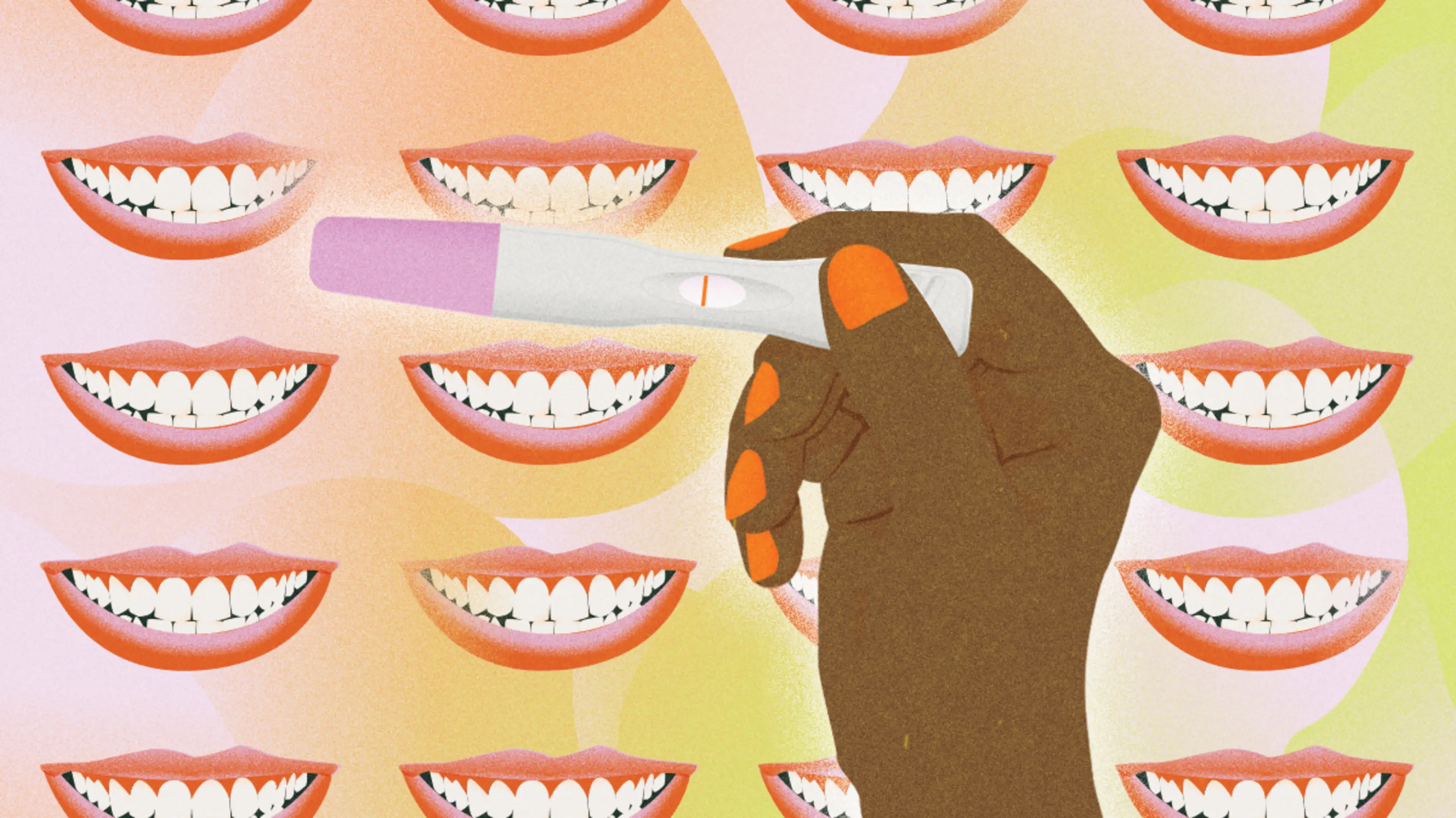TLDR: Perinatal anxiety can affect you during pregnancy and sometimes into your baby’s first year. It’s very common, and also highly treatable with therapy, medication, mindfulness, or other approaches.
Anxiety after the birth of a baby—aka postpartum anxiety1 —is a topic that’s becoming more normalized, but did you know that many women also experience anxiety during pregnancy?
Termed perinatal anxiety2 , it’s the feelings of sadness, anger, worry, or fear during pregnancy or the first year after the birth of your baby—and if you’re having those feelings, you shouldn’t overlook or dismiss them.
What is Perinatal Anxiety?
Perinatal mood and anxiety disorders—also known as PMADs—are one of the top complications of pregnancy and childbirth. They’re very common—around 15% to 21% of pregnant and postpartum women experience PMADs3 .
So, what exactly is perinatal anxiety—and how does it differ from other anxiety disorders that can happen during and after pregnancy? Here’s a quick breakdown:
Prenatal or antenatal anxiety is anxiety that occurs during pregnancy.
Perinatal anxiety is anxiety that happens during pregnancy and up to one year postpartum.
“Baby blues” is the short-term (two weeks or less) feelings of anxiety before or after birth. (Note that people are using this term less, as it can sometimes be seen as diminishing to more serious anxiety and depression.)
Postnatal anxiety is anxiety that happens in the first year after birth.
The Research on Anxiety and Pregnancy
While perinatal anxiety is less researched than PMADs like postpartum depression, it’s no less important and can be treated to combat its negative effects.
According to a 2015 study, high levels of stress and anxiety during pregnancy increased the risk for preterm birth4 , low birth weight, earlier gestational age, and a smaller head circumference, as well as potential issues into childhood, like prolonged crying5 in infants or higher risk of illness6 .
Research also tells us that women with mental health disorders are less likely to seek treatment 7 due to the stigma associated with their diagnosis. Of the women who experience symptoms of perinatal anxiety, fewer than 50% will seek help8 —and even fewer will go on to receive effective treatment.
It’s time to change that.
Symptoms of Perinatal Anxiety
Some level of anxiety and fear during pregnancy is normal. This is a huge moment in your life, and everything around you is changing in a short amount of time. Being scared of the uncertain is both expected and very common—and not just in pregnancy, but in life in general. But when anxiety becomes overwhelming and interferes with your day-to-day life, that’s when you should seek help.
These symptoms of perinatal anxiety9 , as well as others, could be a sign that you have a form of perinatal mood or anxiety disorder and should talk to your healthcare provider.
Physical Symptoms of Perinatal Anxiety
Rapid breathing (hyperventilating)
Difficulty sleeping or restlessness
Increased heart rate
Nausea or upset stomach
Sweating
Trembling or shaking
Tension or muscle aches
Mental Symptoms of Perinatal Anxiety
Difficulty focusing
Feeling on edge
Frequent anger or irritability
Frequent worry or fear
Frequent sense of panic
Intrusive thoughts
Ruminating (dwelling on thoughts)
Risk Factors and Causes of Perinatal Anxiety
Many risk factors have been identified for why we experience anxiety in pregnancy,10 from the increase of hormones circulating in our body to traumatic experiences or external stressors.
These risk factors don’t guarantee you’ll have prenatal anxiety, nor do the absence of these risk factors indicate you won’t get prenatal anxiety—but some people may be more prone to experiencing an anxiety disorder. If you have experienced or are experiencing any of these, it could be helpful to discuss it with your doctor or someone you feel safe with:
Excess stress
Exposure to racism
Family or personal history of anxiety
Lack of support
Previous pregnancy loss
Personal history of drug or alcohol misuse
Thyroid or other medical conditions
Trauma (previous or current)
How Long Does Perinatal Anxiety Last?
Everyone is different, so how long a person might experience PMADs will vary. While some women experience anxiety for several weeks, others may feel its effects for months or even years. The positive news is that perinatal anxiety is very treatable after a diagnosis.
How is Perinatal Anxiety Different from Depression?
The primary difference between anxiety and depression (whether in pregnancy or in general) is the symptoms. A person who is experiencing depression 11 may have some of the same symptoms as above, but they will also experience a prolonged feeling of sadness, worthlessness, or loss of interest in things they used to enjoy.
Even though there’s a difference between them, anxiety and depression often go hand-in-hand. About 60% of people with anxiety also show symptoms of depression12 , and vice versa. Also, each condition can make symptoms of the other get worse or last longer.
How Do I Get a Proper Diagnosis of Perinatal Anxiety?
Perinatal anxiety is still a relatively new concept and may be less understood than postpartum anxiety or depression. In addition to this, many women may avoid treatment for perinatal anxiety if they feel guilt or shame about the experience.
Dr. Lauren Demosthenes, the senior medical director with Babyscripts, encourages you to speak up during your prenatal appointments. She says, “Most healthcare providers will ask you about your feelings, as mental health is just as important as physical health. You can expect to be screened with a questionnaire at least once during pregnancy and then again postpartum.”
But outside of these questionnaires, speaking up can help get the treatment you need. “If you are experiencing any signs of anxiety or depression, you may find help with talk therapy or even medication,” she says.
While there is still a lot to learn about the condition, only a trained healthcare or mental health professional will be able to assess whether you have a perinatal mood and anxiety disorder. Here are a few tips to help get you the treatment you deserve:
Advocate for what you need. The first step happens with you—it can be difficult or scary to talk about how we feel, but it’s the way to start healing.
Talk to someone you trust about how you’re feeling. It can be your partner, ob-gyn, primary care provider, therapist, or friend. While a friend can’t give you a medical diagnosis, they can join you during an appointment or provide moral support.
Ask your doctor or provider if they’ve treated perinatal anxiety before and what treatment methods they prefer.
Some questions to bring up are:
Is medication right for you?
Is a medication and therapy combination better?
Do you want to avoid certain medications during pregnancy?
How do they assess perinatal anxiety and how does it differ from depression?
Do you need a blood panel to rule out underlying conditions?
Ask any questions you have and don’t leave anything out.
Be sure that any screenings or assessments you take are specific to the perinatal period and not just for generalized depression or anxiety. The most commonly used scale is the Edinburgh Postnatal Depression Scale.
How to Cope With Perinatal Anxiety
Perinatal anxiety can affect any pregnant woman or new parent. It doesn’t matter how old you are, your income, race, ethnicity, or education. If you think you may be suffering from PMADs, or perinatal anxiety specifically, there are ways to overcome it.
Practice mindfulness and meditation
There is mounting evidence that shows meditation has benefits when it comes to helping deal with stress. Meditation reduces stress and anxiety, increases mindfulness and awareness, and can help you fall asleep and stay asleep longer.
Studies support the use of meditation as a stress-reducer, with one 2021 randomized controlled trial finding that a mindfulness program reduced stress in women who have had multiple miscarriages.
Dr. Marieme Mbaye, ob-gyn and senior medical director for Noula, agrees, saying, “Meditation not only helps pregnant people lower their stress levels, but it can also help to boost positive feelings and promote the healthy development of their baby. A few studies have even shown that meditation may help decrease the risk of premature birth.
Mindfulness techniques were also found to be effective in improving both the mental health and relationships of women who experienced infertility or were going through reproductive treatment.
So no matter what’s causing your anxiety, meditation may help.
Cognitive behavioral therapy (CBT) or talk therapy
Cognitive behavioral therapy works by asking a patient to change their thinking patterns. By recognizing problems, reevaluating them, and reframing them or finding coping skills, you and your therapist develop a treatment strategy unique to your needs. CBT has been proven to be effective in improving anxiety and related symptoms among women with anxiety disorders in the perinatal period.
If you haven’t worked with a therapist before, now is a great time to start. Nobody is judging you—definitely not your therapist.
If you can’t find affordable therapists in your area, consider a virtual or app-based appointment. Resources like BetterHelp and TalkSpace can be a place to start.
Prescription medication
If other methods of treatment don’t seem to be working, your doctor may suggest medication or a combination of treatment with medication.
Many women are concerned about whether medication will affect them, their baby, or breastfeeding. Many SSRIs (selective serotonin reuptake inhibitors) and SNRIs (serotonin and norepinephrine reuptake inhibitors) are considered safe and effective while breastfeeding and during pregnancy.
As always, talk with your doctor if you have questions about medication types, length of use, side effects for you or your baby, or if you just want more information.
Self-care and lifestyle changes
You can’t just self-care your way out of depression and anxiety. However, increasing some self-care practices like getting enough sleep, eating whole, nutrient-dense foods, and staying hydrated are effective ways to support your mind and body. Here are a few self-care practices you can start today:
Journal when you feel anxious
Limit processed and fast foods
Make time for hobbies
Schedule time to do something you find relaxing
Spend time with friends and family you enjoy
Spend time outdoors
Conclusion
If you’re experiencing perinatal anxiety, you’re not alone.
If you notice any mental or physical symptoms of anxiety, such as panic attacks, feeling on edge, difficulty focusing, or any others, call your doctor as soon as possible. Keep in mind that symptoms may appear all of a sudden, or come on more gradually.
Perinatal mood and anxiety disorders—PMADs—are common but highly treatable. Therapy, medication, mindfulness, and other approaches can help.












